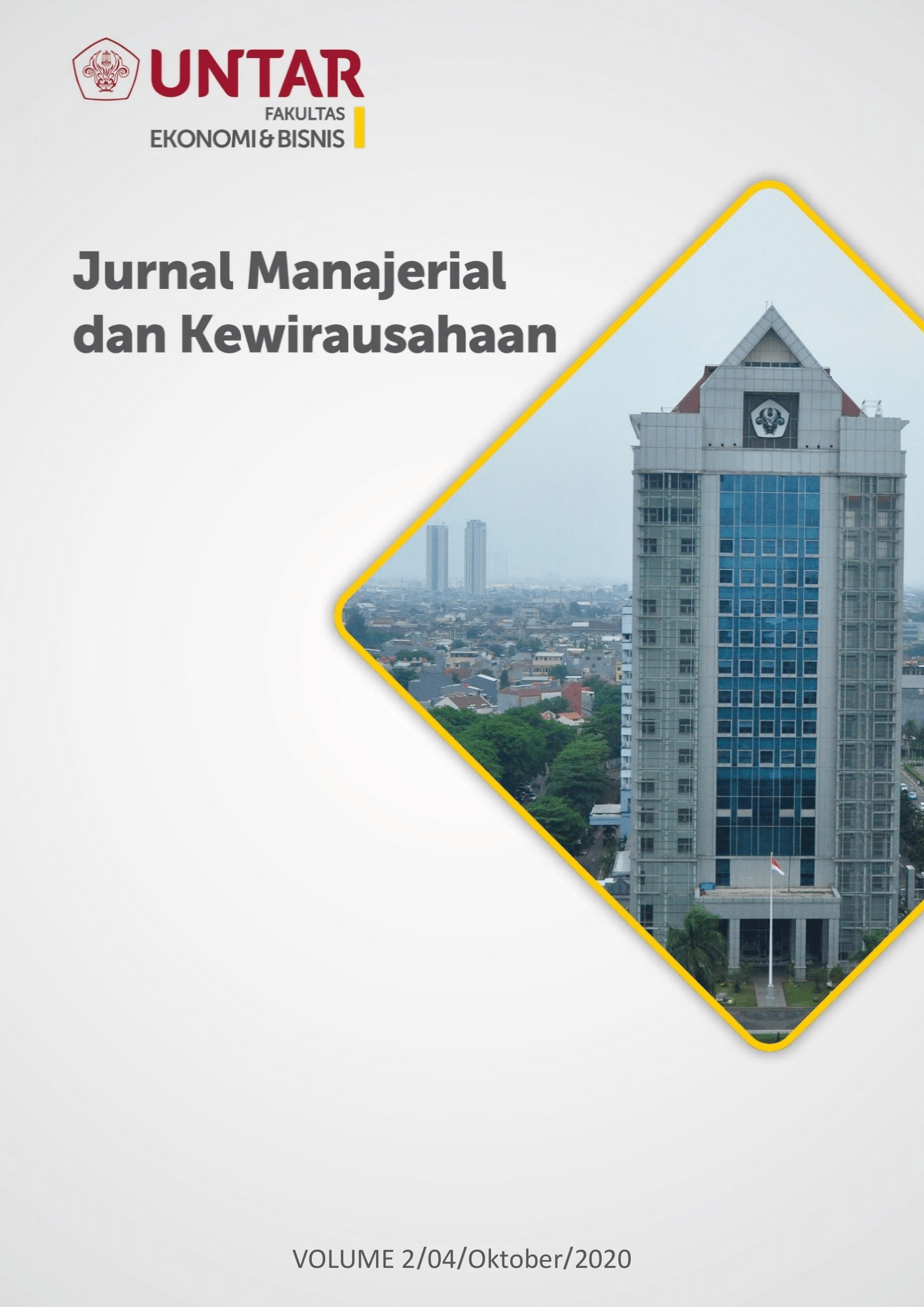Entrepreneurial Education, Green Orientation Entrepreneur, dan Green Value terhadap Ecology Entrepreneurial Intention
Main Article Content
Abstract
The purpose of this research is to determine the impact of entrepreneurialeducation, green orientantion entrepreneur, and green value against the ecology entrepreneurial intention of Tarumanagara University students in West Jakarta. The samples used in this research were 100 respondents who were students of Tarumanagara University in West Jakarta. This research uses Smart Partial Least Square (PLS)software version 3.0 as a data analysis method. The results of this research indicates that green orientation entrepreneur and green value affects the ecology entrepreneurial intention, while the entrepreneurial education does not affect the ecology entrepreneurial intention.
Penelitian ini bertujuan untuk mengetahui pengaruh entrepreneurial education, green orientantion entrepreneur,dan green value terhadap ecology entrepreneurial intention pada mahasiswa Universitas Tarumanagara Jakarta. Jumlah sampel yang digunakan dalam penelitian ini sebanyak 100 responden yang merupakan mahasiswa/I Universitas Tarumanagara di Jakarta. Penelitian ini menggunakan Software Smart Partial Least Square (PLS)versi 3.0 sebagai metode analisis data. Hasil penelitian menunjukkan bahwa green orientantion entrepreneurdan green value berpengaruh terhadap ecology entrepreneurial intention, sedangkan entrepreneurial education tidak memiliki pengaruh terhadapecology entrepreneurial intention.
Article Details
This work is licensed under a Jurnal Muara Ilmu Ekonomi dan Bisnis Creative Commons Attribution-ShareAlike 4.0 International License.,/p>
References
Ajzen. (1985). From Intentions to Actions: A Theory of Planned Behavior. Berlin, Heidelberg, New York, Tokyo: Springer-Verlag.
Bae, T., Qian, S., Miao, C. & Fiet, J. (2014). The Relationship between Entrepreneurship Education and Entrepreneurial Intentions: A Meta-Analytic Review. SAGE journals.
Bowers, T. (2010). From image to economic value: a genre analysis of sustainability reporting, Corporate Communication: An International Journal, Vol. 15, No. 3, pp. 249-262.
Cooney, J., Palapol, Y., Ketsa, S., Stevenson, D., Allan, A. & Ferguson I. (2009). Colour development and quality of mangosteen (Garcinia mangostana L.) fruit during ripening and after harvest. Postharvest Biology and Technology, 51, 349-353.
Dixon & Clifford. (2007). Ecopreneurship – a new approach to managing the triple bottom line. Journal of Organizational Change Management, Vol. 20, No. 3.
Djatmika. (2014). Preparing Green Entrepreneurs for Sustainable Development. JURNAL ENTREPRENEUR dan ENTREPRENEURSHIP, Vol. 3, No. 1,2.
Gibb. (1996). Entrepreneurship and Small Business Management: Can We Afford to Neglect Them in the Twenty? first Century Business School?
Hernandez-Perlines & Manuel. (2018). The Role of Environment in Sustainable Entrepreneurial Orientation. The Case of Family Firms. Entrepreneurship and Business Cases for a Sustainable Accounting and Financial System. Vol. 10(6).
Kirkwood & Walton. (2009). MAKING GREENING MATTER! ECOPRENEURS COMMITMENT TO ENVIRONMENTAL CONCERNS AND ECONOMIC SUCCESS. Academy of Management.
Linan. (2009). Development and Cross-Cultural Application of a Specific Instrument to Measure Entrepreneurial Intentions. Entrepreneurship Theory and Practice, Vol. 33(3), pp. 593-617.
Linan & Fayolle. (2015). A systematic literature review on entrepreneurial intentions: citation, thematic analyses, and research agenda. International Entrepreneurship and Management Journal, Vol. 11, pp. 907-933.
Loscher, P. (2010). Making the global economy more sustainable, Corporate Governing, Vol. 10, No. 4, pp. 349-353.
Nuringsih, K., N, Nuryasman. M., Prasodjo, I., &Amelinda, R. (2019). Sustainable Entrepreneurial Intention: The Perceived of Triple Bottom Line Among Female Students, 23, 168-190.
Patricia, P., & Silangen, C. (2016). The Effect of Entrepreneurship Education on Entrepreneurial Intention in Indonesia. Jurnal DeReMa (Development Research of Management): Jurnal Manajemen, Vol. 11(1), 67.
Rahmawati., Soenarto., Suprapti, A., Handayani, R. & Sudira, P. (2019). Green Entrepreneurship Development Strategy Based On Local Characteristic To Support Eco-Tourism Continuous. Vol. 23, No. 2.
Situmorang. (2011). Pemasaran Hijau Yang Semakin Menjadi Kebutuhan Dalam Dunia Bisnis. Jurnal Administrasi Bisnis, Vol.7, No.2, pp. 131–142.
Sudyasjayanti. (2017). The Green Behavior Differences of Green Entrepreneur Intentions among Male and Female Students. International Journal of Academic Research in Business and Social Sciences, Vol. 7, No. 12, 1326-1335.
Wu, L. & Wu, S. (2008). The impact of higher education on entrepreneurial intentions of university students in China. Vol. 15, No. 4.



